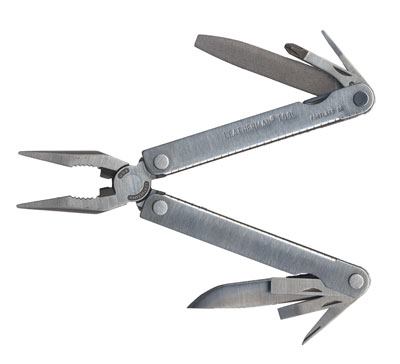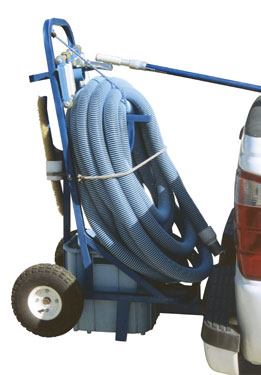Updated 2017. Service technicians rely on a variety of specialty tools, including nets, vac hoses and lid wrenches. But it’s the range of tools not made specifically for the pool industry that form the backbone of their fix-it arsenals.
See what service experts say should be found in your toolbox — and how these tools come in handy on the job.
General tools
Allen wrenches
A set of Allen wrenches can come in a plastic case or in the “jackknife” style, where each wrench folds out of a case one at a time.
Veteran tech Bob Blade carries both. “The jackknife style … keeps them all together. But sometimes you just need the single wrench, and the jackknife style can be cumbersome,” says the owner of Aloha Pool & Spa Service in Pacific Grove, Calif.
Allen wrenches are important because they’re often needed for brand-name-specific jobs. “I use a 1/16-inch for the Laars heater thermostat knob, and the 1/8-inch for the old Sta-Rite motor,” Blade says.
Chisels
Experts recommend an array of chisels: metal, stone, wood, and even a putty knife.
“Wood chisels are for scraping old gaskets off pumps, or calcium off tiles,” Blade says. “A cold steel chisel is for cutting bolts and other metal cutting.”
A carbide tile and masonry chisel can be used for chipping work and cutting out tile.
Files
Although most of today’s equipment is plastic, techs still suggest having a 10-inch, half-round mill file for metal work. It can come in handy when dealing with bronze pump bodies, to clean off burrs, or to fix bent or corroded lids.
Goggles and gloves
Purchase splash-proof goggles for chemical handling, and vented ones to prevent fogging. Experts recommend goatskin or deerskin gloves.
Grooved-joint pliers
These pliers often are referred to as “Channel Locks,” a common brand name. They’re good for grabbing onto pipes and twisting, as well as loosening filter nuts. Don’t use them to tighten PVC unions and filter unions, or you’ll crack the nut, says Blade.
David Hawes, owner of H&H Pool Services in Dublin, Calif., says his pair of grooved-joint pliers is essential. “If I have to grab only a couple tools off the truck to go do some troubleshooting, it’s my screwdrivers and Channel Locks,” he says. “They get me through a lot of things.”
He brings several sizes, including a small model and the standard 12-inch size. “I have a huge one to loosen filter bulkhead fittings. You can use them instead of pipe wrenches. It is a very universal tool,” he explains.
Hammers
Most techs have a collection. Blade uses a hammer and a long block of wood to remove old-style steel filter band clamps or to loosen fitted pump lids.
Rubber mallets also come in handy. “I use a rubber mallet to put filter-lid clamps in place and hit anything that might be damaged by using a conventional hammer,” says Steve Jones, owner of Anglo-American Pool Service & Repair in Torrance, Calif.
Avoid wood-handled hammers because the wood can decay over time when constantly exposed to moisture. Steel, graphite and fiberglass handles are good alternatives.
Leatherman Wave
For all-purpose tools, look for something called the Leatherman. “By far, the best tool for every service [tech] would have to be the inimitable Leatherman Wave,” Blade says.
The device includes two switchlike blades, four screwdrivers (including a Phillips), a sharp saw that can cut up to 2-inch PVC, a hacksaw with an industrial diamond-fused file, scissors, a can opener, wire strippers and needle-nose pliers.
“It’s what most paramedics, firefighters, military and other service trade workers have on their belts as the compact multi-tool of choice,” Blade says.
-
Basic Pool Tools
Service techs turn to these trusty tools time and again when on their routes:

Needle-nose pliers
“Every toolbox needs a pair of needle-nose pliers,” Blade says. “But be sure it’s equipped with wire cutters.”
Experts suggest two styles: long and narrow for getting at hard-to-reach places, and short ones to use primarily as wire cutters.
“Needle-nose pliers are good for holding wires onto relays, so you can tighten them down,” Hawes says. “Mine probably gets used more than any other tool in my box, other than the screwdriver.”
Blade says longer pliers are good for removing leaves, hair and other debris from pump impellers.
Pipe wrenches
Commonly known as monkey wrenches, they’re good to have on hand, even with the advent of plastic pumps and PVC plumbing. “I think Ridgid makes the best, no substitutes,” Blade says. “I have a 24-inch lightweight aluminum type with offset ‘bulldog jaws.’ I don’t used it much anymore except on 1-inch gas lines and big brass pumps.”
PVC pipe cutters
These are essential to getting clean cuts on PVC piping, where a hacksaw won’t give an even cut. They come in several sizes.
Screwdrivers
Sometimes the most basic tool is also the most essential.
“I have three different sizes of the flat blades, and two sizes of Phillips,” Hawes says. “I carry one for lock screws on pumps and for the motor shaft. I use a big one like a chisel or pry bar. I use a very skinny one, about 1/8-inch wide, for electrical work — things like faceplate screws. I also carry very tiny screwdrivers for working on terminals inside controllers.”
Blade has been using a 6-in-1 combination screwdriver set available from hardware stores at a cheap price.
He says: “You can leave a set at all your commercial pools,” he says. “They’re cheap, so I buy one just about every time I go into the store.”
It’s important to replace screwdrivers if they get even the slightest bit worn, Hawes says, or the screws can be easily stripped.
Standard nut drivers
Veteran service technicians say that the 1/16- and 1/4-inch tools are crucial sizes to carry for pool work.
“The 5/16 is the standard nut size on most terminal connections,” Hawes points out.
The tools are important for removing motor bolts, radiator hose clamps and heater tops.
“I generally use nut drivers to dismantle heaters because the variety of the drivers make the job easier than using an ordinary screwdriver,” Jones says. “Hex nuts and screws can be removed and tightened easier with nut drivers.”
Toolmakers also are making them user-friendly. “They come color-coded nowadays,” Hawes says. “For example, I know that the yellow is 5/16 and the red is 1/4 -inch.”
Standard wrenches
Although many manufacturers make filters and pumps that technicians can take apart without tools, experts say plenty of the old-style equipment is still out there, and that requires wrenches.
Experts suggest carrying stock wrenches in sizes from 3/8 through 9/16, as that should cover most motor bolts and the like.
“I also carry a 1/4 -inch and 5/16, open and box end,” Hawes says. “These are good for getting into places where there is no clearance and you can’t use a nut driver.
“Many techs also carry an adjustable crescent wrench, in case they’re not sure of the size of the nut,” he adds.
Wire brushes
Brass or stainless steel brushes won’t rust and are good for cleaning around brass pumps.
Brushes designed to work on plastic and PVC are available, so look for those with nylon bristles, or use an actual toothbrush on those kinds of jobs.




